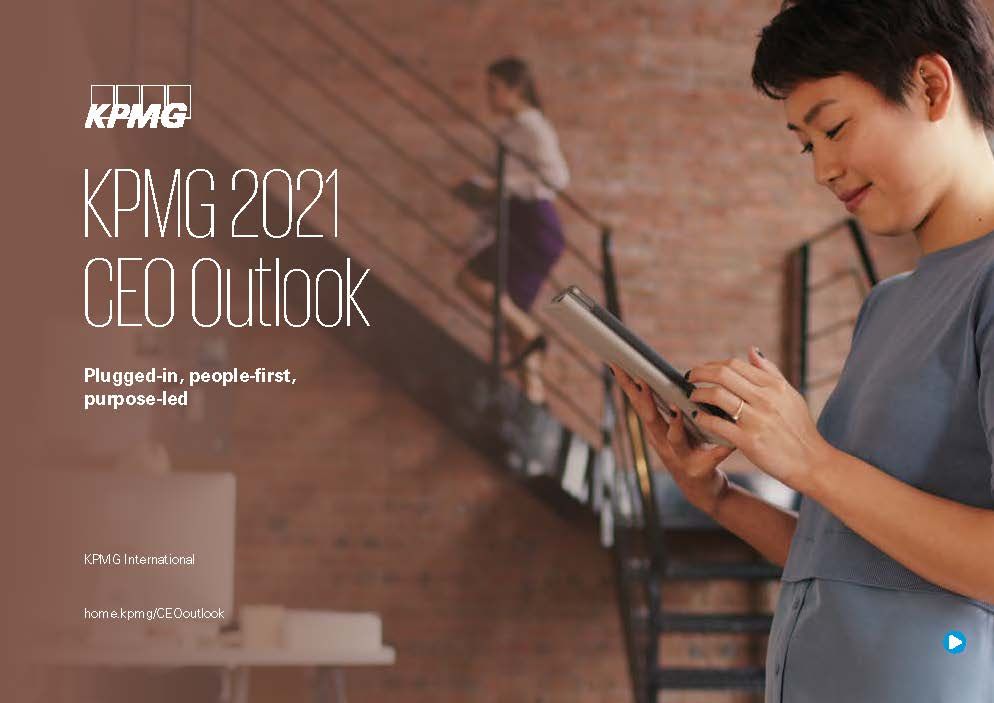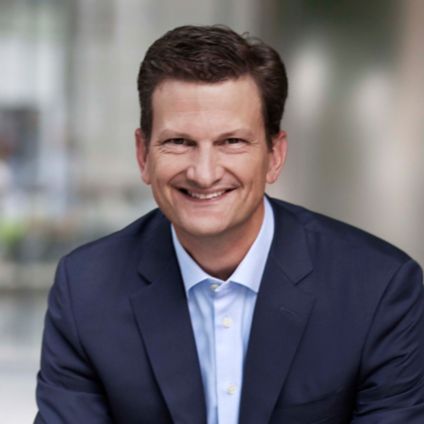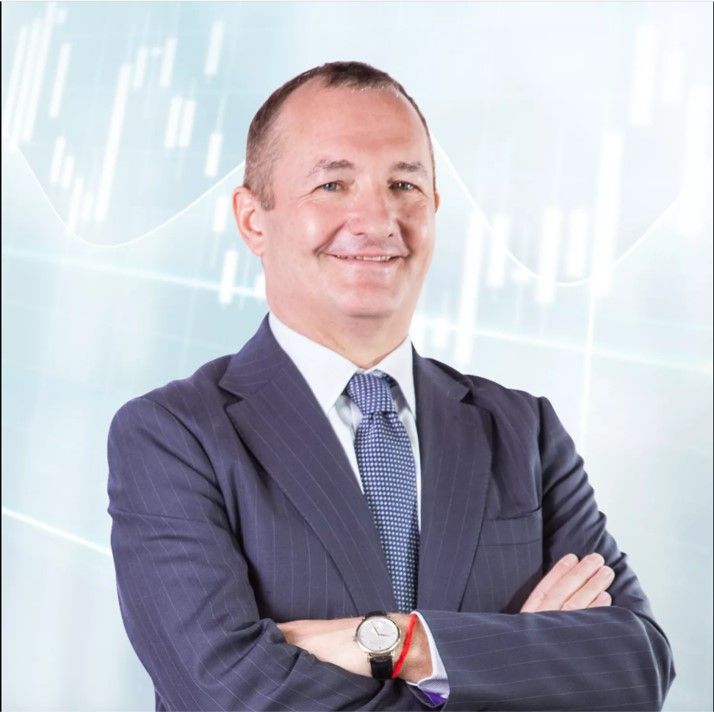KPMG 2021 CEO Outlook
KPMG 2021 CEO Outlook
Plugged-in, people-first, purpose-led.
Optimism is back in the boardroom
It’s been about 18 months since the World Health Organization declared a global pandemic, and the latest edition of our CEO Outlook survey gauges how leadership strategies and concerns have shifted during these demanding times. CEOs are confident in the growth prospects of their company and the global economy in general. They feel a strong connection to their organization’s purpose and are looking to expand their business to emerge stronger.
Executive summary
The KPMG 2021 CEO Outlook draws on the perspectives for the future of 1,325 CEOs across 11 major markets as they look to play a central part in rebuilding the economy and society. We’ve connected regularly with CEOs throughout the pandemic as they manage the impact of COVID-19, they’re optimistic about the economic recovery and continue to put an emphasis on leading with purpose. At the same time, critical societal issues — particularly climate change and inequality — are major challenges.
This year’s survey finds CEOs focused on being plugged-in, people-first and purpose-led to grow their organizations.
Despite the continued uncertainty around the pandemic, CEOs are increasingly confident that the global economy is coming back strong. This confidence has put leadership in an aggressive growth stance. While inorganic growth strategies are a priority, CEOs are also looking to expand organically and continue to assess the future of work to ensure they can attract top talent.
60% global CEOs are confident about the growth prospects over the next three years, and that indicates greater overall economic optimism compared to last year. When demand returns, capital expenditures and employment follow. The pandemic has taught us how to manage business with ever greater efficiency. But the path towards a strong, sustainable growth required attention over managing risks, regulatory burdens and ensuring the continued relevance of our products and services.
1. The road to renewal
The pandemic was a true test of leadership for CEOs: they have had to protect the health and well-being of their employees, make big decisions amid uncertainty, adapt their leadership approach in a virtual environment and prepare for the post-pandemic era. Today, CEOs are facing new challenges as their organizations manage the ongoing impact of the pandemic: balancing the potential to drive growth with uncertainty around the potential of an uneven global recovery.
The growth rebound: The perspectives and confidence of CEOs have shifted. For the first time since January 2020, prior to the pandemic, more than half (60 percent) of global CEOs are confident about the growth prospects of the global economy over the next 3 years.
M&A appetite high: Overall, 87 percent of CEOs say they’re looking to make deals in the next 3 years. Among those, 50 percent characterize their M&A appetite as high.
Three-way tie for top risks: When looking at risks for growth over the next 3 years, CEOs identified supply chain, cyber security and climate change as the top risks.
Leading with purpose: Now, more than ever, people care about what the organizations they support stand for — and CEOs feel they need to create long-term value for all stakeholders, including customers, employees, investors and communities. The survey found that 87 percent said purpose is central to building their brand reputation and 64 percent say their organization’s main objective is to embed purpose in everything they do.
Strengthening digital agility: While more CEOs are prioritizing technology investment when pursuing growth, the 40 percent who are putting more emphasis on people investments is a notable increase from 33 percent in 2020. CEOs are also looking to build human capability, with 88 percent planning to increase employee headcount over the next 3 years.
2. Digital agility
CEOs recognize that the future of work is about more than where people are based. High-performing organizations are those that can flex their technology muscles and their ability to upskill their people. This means having a motivated and highly skilled digital workforce that operates with speed and agility.
Flexibility and the agile future of work: CEOs need to decide on an operating model for the future that works for both employers and employees. Only 37 percent say that they will have a majority of employees working remotely at least two days a week, but 51 percent are looking to invest in shared office spaces.
Cyber security resilience: CEOs recognize the importance of collaboration, with 70 percent saying that new partnerships will be critical to continuing the pace of digital transformation, but 79 percent also point out that protecting their partner ecosystem and supply chain is just as important as building their own cyber defenses.
Disrupting the disruptors: CEOs recognize that digital lies at the heart of how companies can create new sources of value today. CEOs are looking to get on the front foot when it comes to disruption and innovation, with 67 percent saying they will increase investment in disruption detection and innovation processes.
3. Trusted purpose
Today, corporate purpose is a business imperative. Focusing on a bold ESG program can help CEOs demonstrate how they can deliver on their purpose — but the survey also shows there’s still a significant number of CEOs who remain as yet unconvinced about the financial impact of ESG programs. How can CEOs turn their purpose from a statement of intent to real actions?
Putting people first: While 71 percent say CEOs will be increasingly held personally responsible for driving progress in addressing social issues, 56 percent say that — with public, investor and government expectations of diversity, equity and inclusion rising so fast — they will struggle to meet expectations.
The E in ESG: Making progress on climate change will require connected action from both businesses and government, with 30 percent of CEOs planning to invest more than 10 percent of their revenues toward becoming more sustainable. Business leaders are also looking for government support to meet a net-zero target, with 75 percent saying world leaders at COP26 need to inject urgency into the climate agenda.
Making ESG count: Three-quarters of CEOs say their digital and ESG investments are inextricably linked. But more needs to be done to connect ESG strategy with financial returns. While 52 percent of CEOs at high-growth organizations believe their ESG programs improve financial performance, this drops to 37 percent across all CEOs.
Conclusion
Our survey shows that CEOs are more than willing to lead by example to embrace today’s tough leadership challenges. They intend to deliver on their purpose commitments, making the ESG investments and changes necessary to address inequity and launch the race to net zero. They also look to drive growth and prosperity through digital agility and business model innovation, while ensuring that aggressive technology investments are matched by investment in human capabilities and skills.
Methodology
The KPMG CEO Outlook provides an in-depth 3-year outlook from thousands of global executives on enterprise and economic growth.
The KPMG 2021 CEO Outlook asked 1,325 CEOs from among the world’s most influential companies to provide their 3-year outlook on the economic and business landscape, as well the impact that the on-going COVID-19 pandemic will have on their organizations' future. All respondents have annual revenue over US$500M and a third of the companies surveyed have more than US$10B in annual revenue.
The survey was conducted June 29 – August 6 and included leaders from 11 key markets (Australia, Canada, China, France, Germany, India, Italy, Japan, Spain, UK and US) and 11 key industry sectors (asset management, automotive, banking, consumer and retail, energy, infrastructure, insurance, life sciences, manufacturing, technology, and telecommunications).
Note: Some figures may not add up to 100 percent due to rounding.
We invite you to explore our global resource and unpack KPMG’s global research and insights on KPMG 2021 CEO Outlook. We encourage you to contact us to learn more.
Click the link or image below to view the full report.
Are you interested in learning more?
Browse our library on topics related to Vietnam economy as well as articles related to Thought Leadership and Technical Updates
Alternatively, you may explore our list of upcoming OnDemand training courses.



